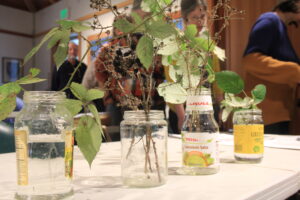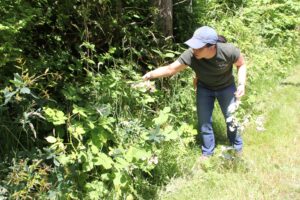Blackberry thickets are a prominent (and prickly) feature of many Pacific Northwest natural areas including at Hoyt Arboretum and many other Portland Parks.
The most common species of exotic blackberry in our region is widely accepted as Rubus armeniacus (AKA Himalayan or Armenian blackberry), but there are a couple of other exotic Rubus spp. that occur in the region. Do different blackberry species occur at the same sites? In similar quantities? Do their distributions change how we manage them? We were interested in answering these questions.
That’s Where Community Scientists Come In!
Involving community members in science projects is an effective way to gather a larger quantity of data from more sites in a relatively short period of time. Moreover, it is a meaningful way to connect local community members to local natural areas and conservation.
Plant Taxonomist & Herbarium Curator Mandy Tu assembled a team of community scientists to survey and assess invasive blackberry species at 13 Portland parks in the summer months of 2018 and 2019. Hoyt Arboretum community science volunteers were trained to identify Rubus armeniacus and Rubus praecox, and to determine their vegetative quantities in the field.




The Results
They found R. armeniacus be broadly distributed across all 13 sites, while a similar-looking invasive blackberry, R. praecox was only present in small quantities at 4 of the 13 study sites.
These results do not support changing land management practices, but this study will serve as a model for the successful engagement of community members in science that supports local conservation.
Published in Natural Areas Journal
Mandy recently published a peer-reviewed article about this project in Natural Areas Journal. Congrats to Mandy and the community science volunteers who contributed to this work!
Read the full article here: Community Scientists Survey and Assess Invasive Rubus Spp, in Portland Natural Areas…
